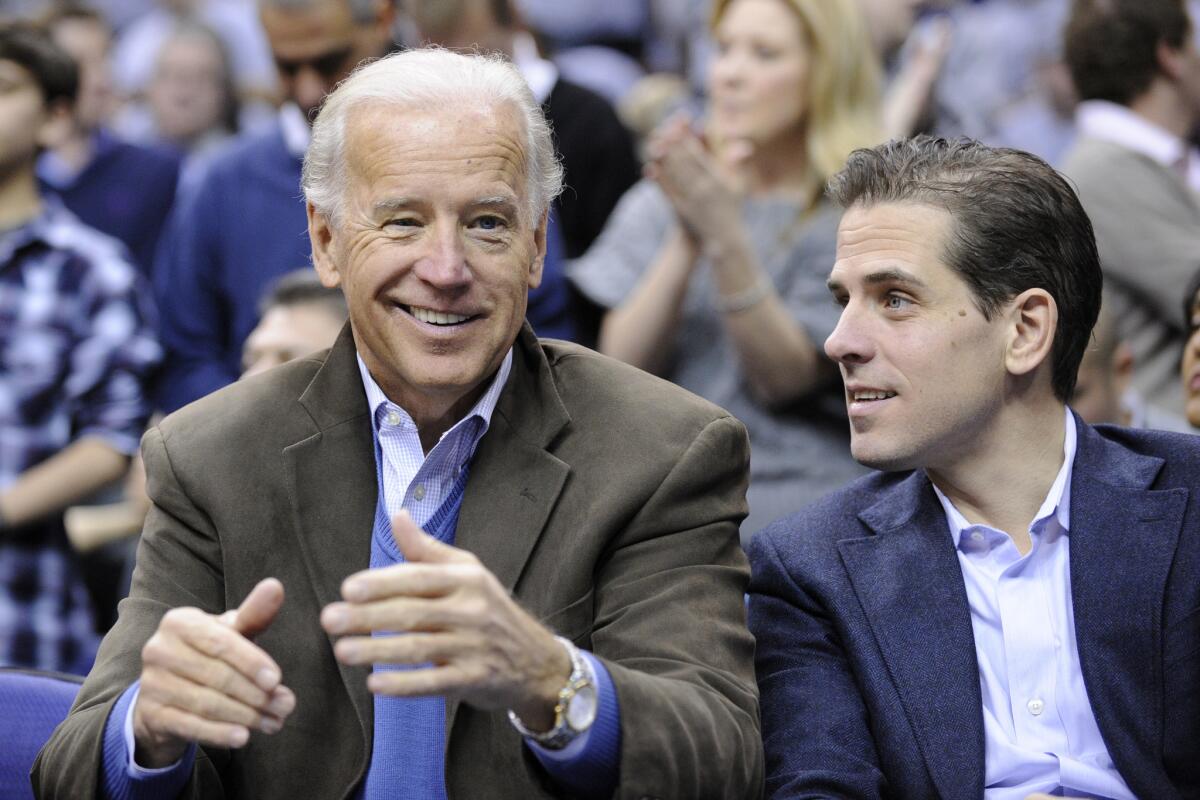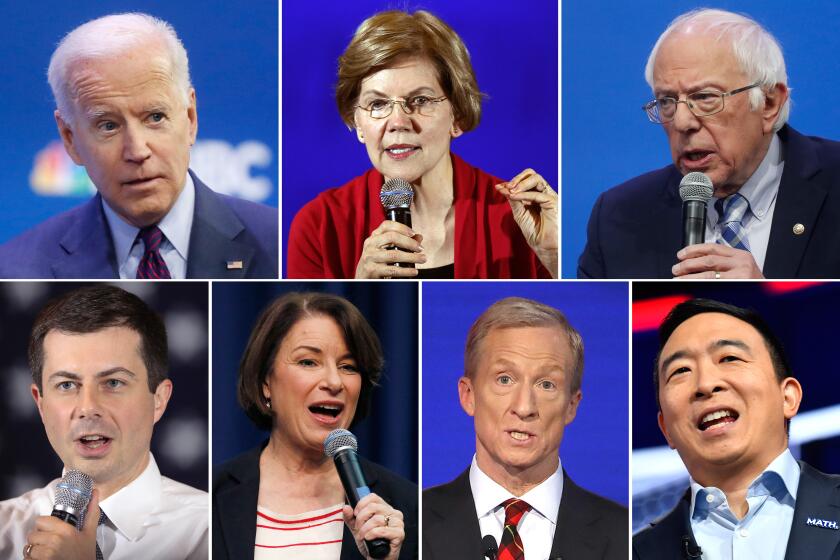Trump impeachment? Democratic presidential candidates want to talk about anything but

- Share via
WASHINGTON — The historic drive to impeach and remove President Trump has consumed Washington like a fever dream for months, but for politicians and activists girding for the 2020 elections, it’s been another story.
Democratic presidential candidates barely mention it. Republicans running in swing states have been trying to change the subject. In battleground states like Wisconsin, Democrats are trying to engage voters on kitchen-table issues, not impeachment.
“We are in a tough spot here,” said Martha Laning, the former Democratic Party chair of Wisconsin, where the party is trying to rebuild the “blue wall” that once buttressed Democratic presidential nominees. “We want to do what we have to do on this and move on.”
At the Democratic fundraising powerhouse Priorities USA, a super PAC that is planning to spend $100 million on anti-Trump digital and television advertising before the party even chooses its nominee, officials do not envision a single ad will focus on impeachment.
After all the drama in Congress and fulminating from the White House, the political fallout may be an anticlimax: This moment in history seems likely to intensify, not change, voters’ attitudes toward Trump.
His dismal job performance ratings have changed little since impeachment began. The economy keeps humming. A significant trade deal was just inked. The courts are being reshaped in Trump’s image as White House judicial nominees cruise to confirmation. But Trump’s standing seems as immune to good news as bad.
“His ratings have been stable through months of impeachment discussion — it is hard to imagine that being true for another president,” said GOP pollster Bill McInturff. “On the other hand, with an economy this good, other presidents would be enjoying higher approval ratings.”
The impeachment drama will doubtless help candidates in both parties motivate their activist base, at least somewhat. But when it comes to persuading swing voters in battleground states, impeachment creates risks in either party.
For Sen. Susan Collins, the Republican incumbent who is up for reelection in the blue state of Maine, for example, impeachment forces her to choose between the wrath of Trump fans if she votes against him and anti-Trump voters if she does not.
The December Democratic debate in Los Angeles was touch-and-go over a labor dispute, but it’s back on. Here’s what you need to know about Thursday’s faceoff.
For Democrats in Wisconsin, on the other hand, impeachment triggers anxiety that harks back to the loss the party suffered after a 2012 effort to recall Republican Gov. Scott Walker. That unsuccessful drive only strengthened Walker’s support with voters and helped build the foundation for the governor’s reelection in 2014 and Trump’s victory two years later.
Public opinion on the proceedings barely budged since the first weeks of the impeachment drama, with the nation nearly evenly divided on whether Trump should be removed from office. Focusing on the issue after the Senate holds what is expected to be a speedy trial in January ending with an acquittal might only serve to irritate swing voters, many political strategists believe.
“They think impeachment is a distraction,” said Rich Thau, moderator of the Swing Voter Project, which is holding focus groups in the industrial Midwest among Trump voters who previously cast ballots for Barack Obama. “The prevailing mindset is that members of Congress are not focusing on their needs by trying to remove the president.
“The outcome of the last election in large part was determined by these people,” Thau said. “This is further evidence to them that Washington is totally out of touch with their needs.”
In the project’s most recent focus group, in Saginaw, Mich., on Dec. 9, the swing voters were confused by the rationale for impeachment, concerned about how much it was costing taxpayers, and inclined to see the entire episode as another example of Trump’s resilience in taking on a corrupt establishment.
The findings track with those from America First Policies, a pro-Trump group that held 18 focus groups of undecided voters in battleground states in October and November, as the impeachment process was going full tilt.
“Everyone knows who the president is,” said Kelly Sadler, communications director for the group. “They may spend time saying we don’t like his tweets, we wish he acted more presidential. One guy said he did say something inappropriate in the Ukraine call, but that’s who he is.” Yet those voters largely found the impeachment process a costly partisan exercise that did not change their views of Trump, for better or worse.
The weight such voters will carry in November is in dispute back in Washington. Democratic pollster Anna Greenberg says the hand wringing about how to persuade such “Obama to Trump” Midwesterners is misplaced.
“A huge number of them were [George W.] Bush voters who got so angry with him they voted for Obama,” she said. “They were not necessarily real Democrats in the first place.”
But she also sees impeachment as unlikely to sway persuadable swing voters either way.
Josh Schwerin, a senior strategist at Priorities USA, agrees. “This is not going to be the deciding factor for many voters,” he said “Our plans continue to focus on kitchen-table issues. Voters are not hearing about the harmful economic policies Trump has pushed. We are going to continue to stick with that in our ads.”
When a GOP-dominated House voted in December of 1998 to impeach Bill Clinton, the party’s predictions that voters would reward them for it had already been shattered in midterm elections the previous month. Republicans lost seats that year, the first time a party not controlling the White House suffered losses that deep into a presidency in a century and a half.
That memory has some Democrats relieved that this impeachment process will likely be over and done with a full 10 months before the November election.
“By the time we get to the 2020 election, impeachment is likely to seem small in the rear-view mirror,” Paul Begala, who was a senior advisor to Clinton, wrote in an email. “In 1998, impeachment hurt the GOP badly. I see no evidence of that boomerang effect this time. More likely, 2020 will be fought on healthcare, Medicare, Social Security and other bread-and-butter middle-class issues.”
The wild card, of course, is Trump himself. He may not hesitate to make his grievances about the impeachment a pillar of his reelection campaign, regardless of the damage that could do to Republican lawmakers eager to shift voter focus away from the unnerving findings of House investigators.
“I have no doubt the American people will hold you and the Democrats fully responsible in the upcoming 2020 election,” Trump wrote in his angry six-page letter to House Speaker Nancy Pelosi on the eve of the impeachment vote. “They will not soon forgive your perversion of justice and abuse of power.”
The other unknown is to what extent the drama in Washington may shape voter attitudes toward the Democratic contenders, particularly former Vice President Joe Biden. The inquiry has focused an unflattering light on his son, Hunter, and his business dealings in Ukraine. America First Policies says voters in its focus groups find Hunter Biden’s international business dealings unseemly, making it a potential point of attack.
Even as that might hurt Biden, concern on the part of Democratic voters about Trump’s resilience through the impeachment has intensified the focus on picking the nominee best equipped to take him on. As Biden makes electability his central selling point, recent polls show him holding or widening his lead over Democratic rivals.
In Marquette Law School’s latest survey in Wisconsin — in which voters were against impeachment 52% to 40% — Biden narrowly edged Trump, by 47%-46%, essentially a tie. The other Democrats narrowly trailed Trump, also by point spreads well within the poll’s margin of error.
Whoever the nominee is, there is wide agreement among party officials that dwelling on one of history’s most consequential undertakings won’t help Democrats.
“If Trump is defeated, the scandals will have contributed,” said Brian Fallon, who was an advisor to 2016 Democratic nominee Hillary Clinton. “But it is already priced into the stock.”
He added: “It serves the nominee little to talk about them. Everyone already knows about them. They need to take him on on a perceived strength and talk about bread-and-butter issues.”
More to Read
Get the L.A. Times Politics newsletter
Deeply reported insights into legislation, politics and policy from Sacramento, Washington and beyond. In your inbox three times per week.
You may occasionally receive promotional content from the Los Angeles Times.










